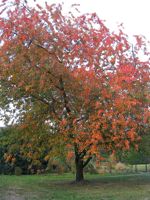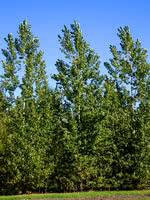Mon-Fri 9am - 5pm Mountain time
Black Cherry vs Skyfest Poplar
Prunus serotina
Populus x deltoides jefcot
NOT AVAILABLE THIS SEASON - MIGHT RETURN
Black Cherry is common in eastern North America but a rare find elsewhere. This tree is shade tolerant and is often found in old fields, forest openings, and along fencerows.
The fruit is edible and is commonly used to flavor rum and brandy. It is also edible and often eaten fresh or used in wine or jelly. Black Cherry trees typically begin producing fruit when they are 10 years of age.
Black Cherry wood is a rich reddish-brown color and is strong, making it valued in cabinetry and woodworking. It is often used in reclamation as well.
The leaves can poison livestock as they contain cyanide derivatives and precursors. However, many have noted that deer still seem to browse their trees with impunity and birds and other animals eat the fruit when available.
Bred by Jeffries Nurseries, the Skyfest is a fast growing, tall cottonwood with excellent disease resistance and adaptability to many kinds of soil. In the fall, its leaves turn a golden yellow.
This species has an aggressive root system, making it unsuitable for planting close to buildings but very drought resistant and an excellent choice for shelterbelts.
Black Cherry Quick Facts
Skyfest Poplar Quick Facts
Toxicity: bark and wilted leaves toxic to livestock

